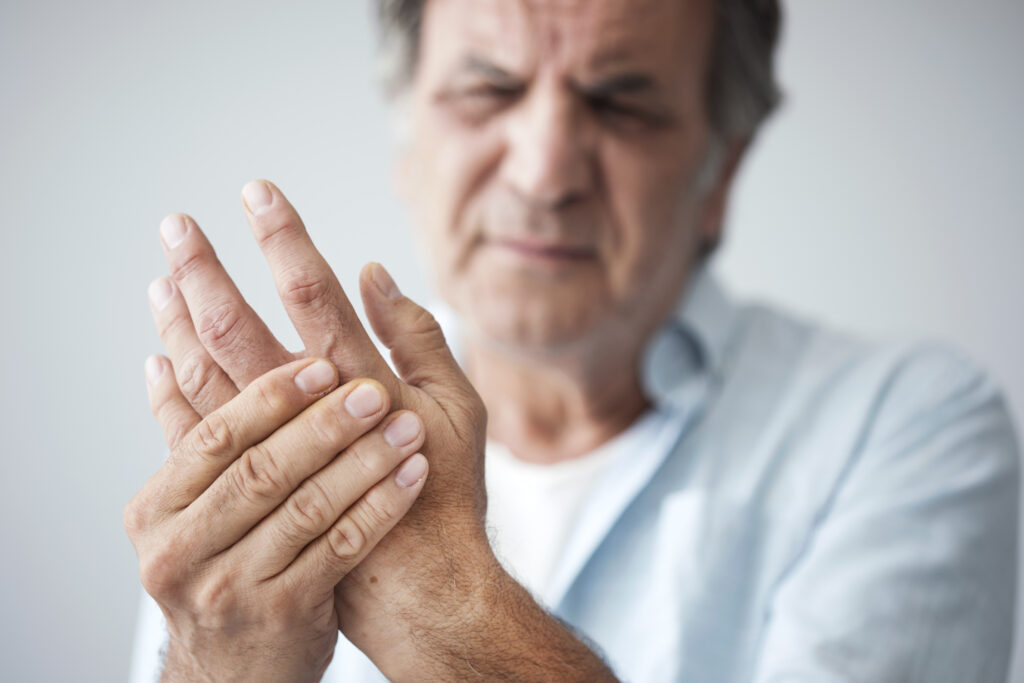
Many Americans have trouble falling asleep or staying asleep.1 The reasons for that are many and varied—stress, illness, pain, some medications, hot flashes or hormone fluctuations, age, blue light (cell phones, computer screens) and, of course, sleep environment—mattress comfort, noises, lights, pets, neighbors, other family members.2
But people with rheumatoid arthritis are much more likely than the rest of the population to also suffer from obstructive sleep apnea (OSA). How much more likely? A recent study found the incidence rate of sleep apnea was 75% greater in people with RA than in those without the disease.1
Why is this true? Researchers are not certain.1 But, as with insomnia and other sleep problems, there are many possible explanations:
Structural differences of the head, neck, and spine
That increased sleep apnea risk could be due to structural anomalies of the head, neck, and spine that are common in people with RA, such as:
– underdeveloped lower jaw
-reduction of the size of the upper airway due to the degeneration of the temporomandibular joints (TMJ)
-narrowing of the spaces between cervical vertebrae that can cause compression on the brain stem and affect the severity of sleep apnea1
Inflammation
Arthritis is generally thought of as an inflammatory disease. RA in fact increases certain proinflammatory cytokines, such as tumor necrosis factor (TNF), and these intercellular signaling proteins are involved in the process of normal sleep regulation.1
Regina M. Taylor-Gievre, MD, who researches inflammatory arthritis and sleep disorders, says higher TNF levels have also been reported in sleep apnea. As she explained in an article for the International Journal of Clinical Rheumatology, in someone who has RA, it could be that this increase in TNF levels could increase susceptibility to OSA.1
Obesity
Obesity appears to be another common connection between OSA and RA. Half of people with sleep apnea are overweight, and two-thirds of people with RA are overweight or obese. Carrying extra weight increases the chance of having OSA, because weight gain can cause fat to accumulate in the neck area (which obstructs breathing, and so could lead to OSA). Also, fat cells release cytokines, so having more fat cells means more inflammation, which can also contribute to RA.1
Dr. Taylor-Gievre says there is also speculation about the role of fatty tissue in promoting inflammatory processes like RA directly; meaning it’s possible increased cytokines from excess fat may actually lead to the development of sleep apnea and/or rheumatoid arthritis.1
Other risks from sleep apnea and rheumatoid arthritis
Regardless of the reasons why OSA and RA are prevalent together, it’s important—maybe critically important—for people to find out whether they have a sleep disorder. Both sleep apnea and rheumatoid arthritis are associated with increased risks of cardiovascular disease, including heart attack or stroke. OSA is even associated with sudden death.1
Screening and testing for sleep disorders
The discovery process usually begins in a doctor’s office, and often with a screening questionnaire such as the STOP-BANG (which guides the patient to answer question about Snoring, being Tired, whether anyone has Observed breathing stopping or choking or gasping, high blood Pressure, high Body Mass Index or BMI, Age, Neck size, and Gender).3
If sleep apnea is suspected, a test would follow—either an overnight stay in a sleep lab using polysomnography, or a home sleep apnea test (HSAT). Diagnosis is relatively easy after testing, and so is treatment. Different kinds of treatments are available, from continuous positive airway pressure (CPAP) to oral devices and medical procedures. All are worth consideration for uninterrupted, restful sleep, which is really priceless.
REFERENCES
1
Repinski K. Sleep apnea and rheumatoid arthritis: what to know about the link. Creaky Joints. Jun 18, 2019. https://creakyjoints.org/comorbid-conditions/sleep-apnea-rheumatoid-arthritis/
2
Santos-Longhurst A, Castiello L (medical reviewer). Why you can’t seem to stay asleep (plus, how to finally catch some zzz’s). Healthline. Jun 30, 2021. https://www.healthline.com/health/healthy-sleep/why-cant-i-stay-asleep
3
The Official STOP-BANG questionnaire. Toronto Western Hospital, University Health Network, University of Toronto. http://www.stopbang.ca/osa/screening.php
